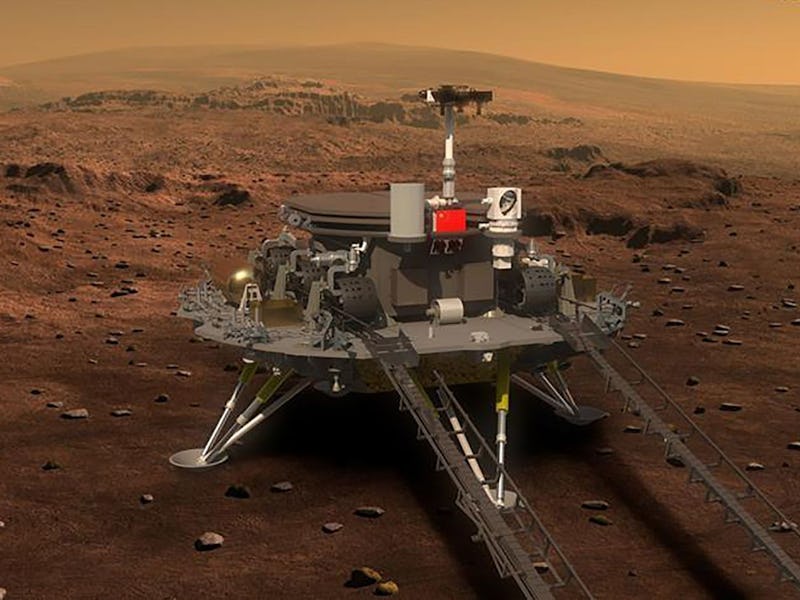
China will launch its first probe to Mars by July or August of 2020, state media reported Tuesday, signaling a firm intention by the Chinese government to push the country forward in competition with other parties around the world in the race to explore and establish a presence on the red planet.
China will launch the probe from China’s southern Hainan province aboard its Long March 5, according to Wan Weixing, an academician at the Chinese Academy of Sciences and a chief scientist of China’s Mars exploration program. Seven months after its launch, the probe will reach Mars.
The probe consists of an orbiter, lander, and a rover, and it will study the surface, atmosphere, underground environments, and space around Mars. The rover will search for water and ice and even take radar images 400 meters underground. Meanwhile, the orbiter will monitor the Martian environment from above.
The probe is expected to send back data in 2021 about the planet’s features, as well as any signs of possible extraterrestrial life, ancient or current. The life expectancy of this probe is one Martian year, or about two Earth years.
China officially approved its first mission to Mars early last year. Leading up to this, scientists conducted feasibility studies and set scientific goals and plans. The exploration program has also started working on satellite probes, ground data application, rocket launches, and monitoring and control systems.
Right now, China is working on a model prototype of this probe, China Daily reported. The probe is currently unnamed, but in January, China unveiled a shortlist of eight names, which were selected from a list of more than 35,900 entries. China will announce the official name on its national Space Day on April 24.
So far, the United States is the only country to land a rover on Mars, but Europe and Russia are working together to send another rover there in 2020 as well.
China’s mission would make it the fifth country to send an orbital spacecraft to Mars, after the U.S., Russia, Europe and India.
China’s Mars rover will weigh about 440 pounds, have six wheels, and be powered by four solar panels. It will also carry 13 sets of equipment, including a remote sensing camera and ground-penetrating radar to study Mars’ soil, environment, and inner structure, as well as look for water and ice.
In comparison, the European Space Agency’s ExoMars rover also has six wheels and will use solar panels to generate the electrical power it needs. It uses navigation stereo cameras, sun sensors, ground penetrating radar, and a subsurface sampling device that can drill into Mars’ surface and analyze samples.
NASA’s Mars 2020 rover has six wheels and will be about the size of a car, weighing over 2,300 pounds. It uses a radioisotope power system to convert heat from the radioactive decay of plutonium into electricity. It will carry computer, electronic, and instrument systems, including cameras to study Mars’ environment and an arm to collect rock samples.
China’s space program has faced number of challenges over the last few decades, such as taikonauts (Chinese astronauts) being banned from the International Space Station, and the failure of the country’s first Mars orbiter mission in 2011, which traveled on a Russian spacecraft.
However, China has doubled down on its space efforts in recent years, and the results have been quite noticeable. Although China says its space program is for peaceful purposes, the U.S. Department of Defense cited China’s growing space capabilities as a potential threat, and said China is seeking activities aimed to keep adversaries from using space-based services during a crisis. The U.S. also banned NASA from cooperating with China because of security concerns.
In addition, China’s efforts pit it directly against another Asian country: India sent an orbiter to Mars in September 2014, and it set a world record in February by launching 104 satellites from a single rocket.
“Although we are not the first Asian nation to send a probe to Mars, we want to start at a higher level,” aerospace expert Ye Peijian, an academician of the Chinese Academy of Sciences, told Xinhua last March.
Wu Yanhua, deputy chief of China’s National Space Administration, said China’s space program has planned two Mars missions and one to Jupiter and its moons. The second Mars exploration around 2030 will bring back samples.
“Our overall goal is that, by around 2030, China will be among the major space powers of the world,” Wu said in January.